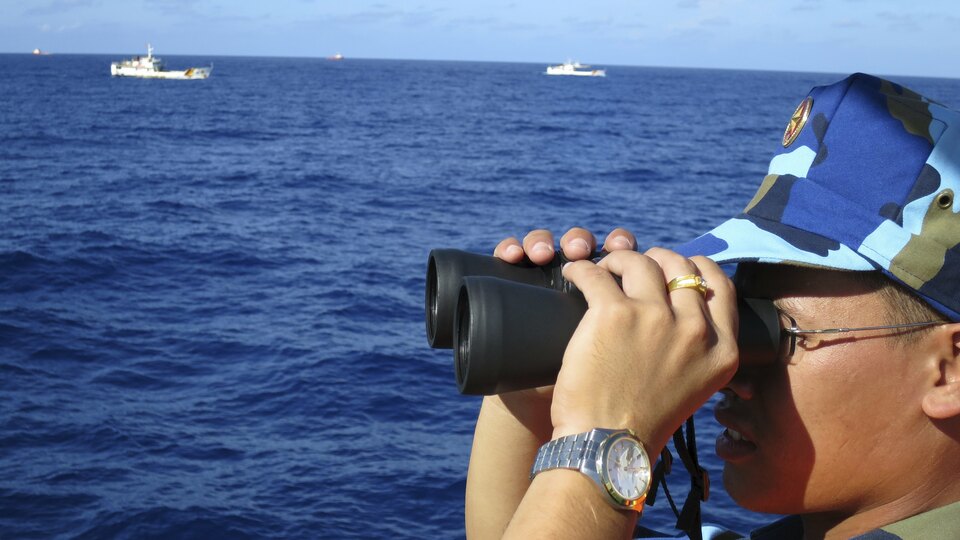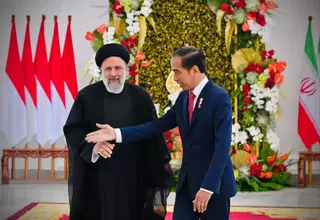Chinese Marines' Desert Operations Point to Long-Range Ambitions

Beijing. Days after China passed a new law that for the first time permits its military to venture overseas on counter-terror operations, its marines began exercises in the western deserts of Xinjiang, more than 2,000 kilometers from the nearest ocean.
The continuing drills are an indication, analysts say, that the marines, who have traditionally trained for amphibious assault missions, are being honed into an elite force capable of deploying on land far from mainland China.
China's limited means to respond to threats abroad were highlighted by two incidents in November: when Islamic State executed a Chinese hostage, and the killing of three executives by Islamist militants who attacked a hotel in Mali.
China's new counter-terrorism law, passed in late December, is aimed at protecting its expanding global commercial and diplomatic interests. But China's military commanders are also trying to create a military in the likeness of the world's most dominant power projection force, analysts say.
"They study what the Americans have done very carefully and it's the mirror image effect," said Leszek Buszynski, a visiting fellow at the Australian National University's Strategic and Defense Studies Centre.
The cold weather training will improve the marines' ability to conduct "long-distance mobilization in unfamiliar regions", the deputy chief of staff of the Navy's South Sea fleet Li Xiaoyan said in a Ministry of Defense statement earlier this month.
During the drills, the marines will travel 5,900 kilometers via air, truck and rail beginning in the southern province of Guangdong, the longest range maneuvers ever conducted by the force, state media said.
Expeditionary force
The exercises are the latest in recent years that show the efforts China is making to boost its expeditionary force capabilities.
In 2014, the marines conducted their first training in the grasslands of the northern landlocked Inner Mongolia region. At the time, the exercise was seen as unusual for the south China-based force more proficient in beach landings.
Since those drills, the roughly 15,000-strong marine corps, which operates under the People's Liberation Army (PLA) Navy's South Sea fleet, appears to be settling into a new niche.
"They never really had a major strategic role, as force projection wasn't something the PLA was willing, or able, to think about even ten years ago," said Gary Li, an independent security analyst in Beijing.
With amphibious divisions in the PLA Army also capable of extending China's reach into the South China Sea and Taiwan, Li said the marines are a good fit for a budding Chinese expeditionary force.
"The main advantage of playing around with the marines is that they have a higher concentration of specialists, act well as light infantry, have good esprit de corps, and are nimble enough to be deployed over long distances if needed," he said.
Rising global profile
Along with President Xi Jinping's vows to build a more modern military, the global profile of China's armed forces is on the rise.
Already, the South Sea fleet, which is based on the mainland coast near the island of Hainan, has been used on operations far from the South China Sea.
The fleet's vessels have ventured to the Middle East and Mediterranean after deployments on international anti-piracy patrols around the Horn of Africa.
Chinese officials announced in November they were in talks with Djibouti to build permanent "support facilities" to further boost Chinese naval operations, in what would be China's first such off-shore military base.
The African port, sitting on the edge of the Red and Arabian seas, is home to several foreign military bases, including US, French and Japanese naval facilities.
China is also expanding its peacekeeping role, with Xi pledging in September to contribute 8,000 troops for a UN stand-by force that could provide logistical and operational experience the PLA would need to operate farther abroad.
While China has been getting more involved diplomatically in trouble spots like the Middle East, it is adamant that it does not interfere in the affairs of other countries, and is the only permanent member of the UN Security Council which has not taken military action in Syria.
The Defense Ministry said in a fax that the drills were part of "annual planned" exercises.
For now, China's marines are advancing only through the snow fields of Xinjiang, as depicted in state media photographs, still wearing their speckled blue fatigues designed for operations at sea. But that could shift in time.
"China's global security posture is becoming more active," said Zhang Baohui, a mainland security expert at Hong Kong's Lingnan University. "And this seems to fit that policy."
Additional reporting by Matt Siegel
Reuters
Tags: Keywords:POPULAR READS
Apple Wants to Increase Investments in Vietnam
Vietnam has become more important to Apple as the company seeks to diversify its supply chains away from China.China’s Top Diplomat Wang Yi to Visit Indonesia for Cooperation Talks
Chinese top diplomat Wang Yi will chair a policy coordination meeting aimed at strengthening Indonesia-China cooperation.President Jokowi Urges Global Restraint as Tensions Rise in the Middle East
President Joko "Jokowi" Widodo emphasized the importance of diplomatic efforts to prevent the escalation of conflict in the Middle EastKPK Identifies Sidoarjo Regent as Suspect in Corruption Probe
KPK has identified Ahmad Muhdlor Ali as a suspect in a corruption case involving the Sidoarjo Regional Tax Service AgencyEconomic Concerns Overshadow Security Worries for Indonesians in Iran
Indonesian citizens currently in Iran are more concerned about rising inflation than the security situation in the country.Popular Tag
Most Popular






















